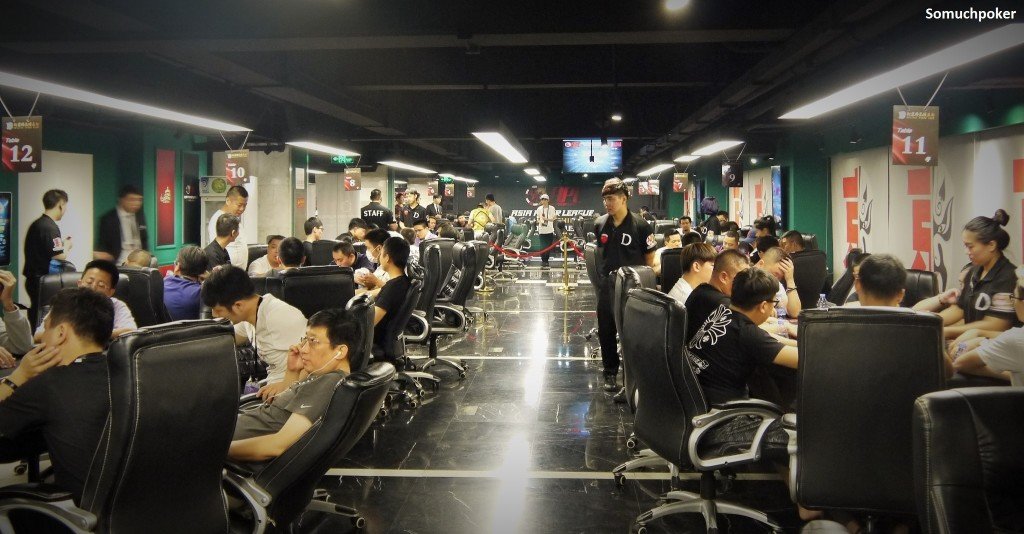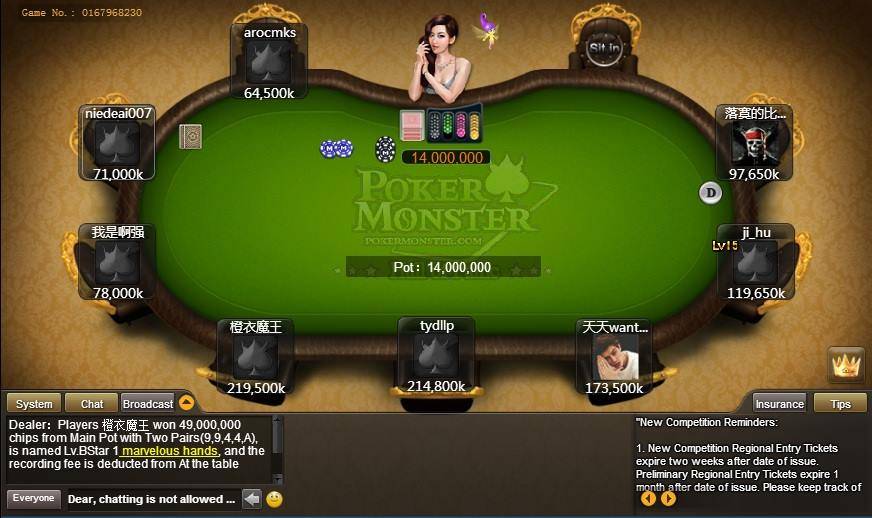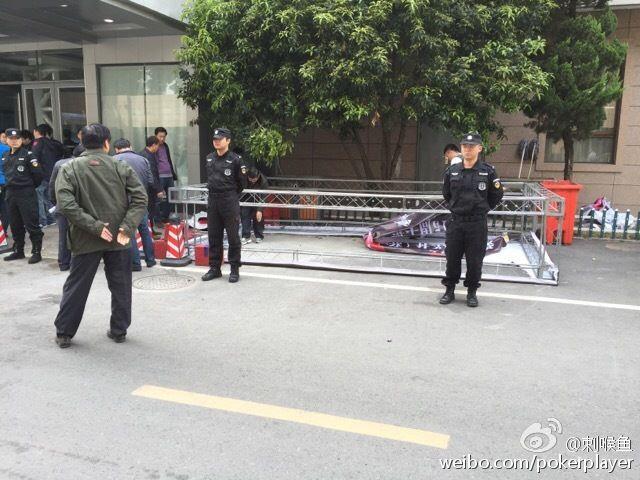“Poker is booming in China” – You may have already heard this said numerous times. As a matter of fact, for players in Asia and in other continents, it has been a trendy topic of discussion. It’s been talked about so much that some media have started to write about it by reporting an increase in the number of participants in tournaments hosted in Macau.
But the truth is what is happening in the Mainland China Poker Scene, for the large part, remains relatively unknown.
In August 2016, the Somuchpoker team spent two weeks in Beijing to scout out the goings-on of poker in China. We started by attending the first offering of the Asian Poker League (APL) which guaranteed a $500,000 prize pool. We then visited poker clubs and conducted several interviews to get a feel of the backdrop of the poker scene in the People’s Republic.

Here’s an overview of what has already transpired in the recent history of Poker in China:
The Ancestor: Tractor Poker
When talking about poker, it’s important to note that the Chinese are not really new to the game. China has a long tradition of card games including its own form of Poker called Tuo La Ji (拖拉机) or Tractor Poker. Tractor Poker is played with 2 decks and 4 players in fixed partnerships. Similar to the game of Mahjong, Tractor Poker follows a point system with the objective of 1 team reaching a score of above ace while preventing the other team from doing so.
In 2002, the China State Sports Administration (CLSAC), the government body that handles leisurely sports, accepted this game as a mind sport and standardized its rules to allow for national competition. Making the rules uniformed throughout the great land mass of China balanced the playing styles in different regions and made nationwide competitions more manageable.
Seeing an immense opportunity, the World Poker Tour (WPT) eased itself into the great wall of China by using the government accepted game of Tractor Poker. In 2007, the WPT got a 5-year license from the CLSAC to broadcast the National Tractor Poker Tournament series on national television. This, of course, was still not the Holdem the rest of the world was playing. But airing Tractor Poker to all areas of China, and achieving great visibility for any variant of poker, triggered a level of awareness that would serve as the jumpstart for the poker boom in the country.
The Beginnings of Texas Hold’em in China
While Tractor poker was transforming from a family past time into a national sport, Texas Holdem, the international poker variant everybody knew, was beginning to take root behind the scenes.
Somewhere in the 90s, especially in expat populated cities like Beijing and Shanghai, Holdem was being introduced by foreigners in home games. With the background of Tractor Poker, it was easy for the Chinese, especially the western educated ones, to fall in love with the game. And as such, the game started gaining ground, and casual home games became a little bit more organized.
Organizers started renting apartments and hiring dealers to run games. Typical games were played with limits of US$1/$2 and US$2/$5 with a 5% rake and no cap. These games normally went on non-stop 24 /7.
This was going on without any issue with the Police force for 2 reasons:
1.) At this time when Mainland China was still starting to lower its walls to the rest of the world, the government, who was still trying to build rapport with the international community, avoided any encounters that may create animosity and did not interfere with the activities of the expats living in the country;
2.) The game of Texas Hold’em was relatively unknown and was only being played by a very small population.
Eventually, however, locals became exposed to Texas Hold’em by joining these organized home games. Moreover, the growing number of Chinese people travelling and studying abroad bolstered exposure to the game creating a backdrop that made Hold’em grow in popularity FAST.
The Onset of Poker Rooms in China
As a result, between the years 2008 and 2009, Hold’em Star Club, the very first Texas Hold’em poker room, opened its doors in Beijing. After their launch, however, numerous other poker rooms and clubs followed suit and started business in Beijing and Shanghai.
Read more: Interview: CEO of Beijing Poker Club, Zhang Yangchun
As gambling was illegal in the mainland, operators could not “officially” offer cash games to its clientele. Instead, they held authorized tournaments with an entry fee to join. In place of a cash prize, players were competing to win prizes that were easily convertible to cash – some were Apple products like iPads and iPhones, or travel vouchers, etc. But it didn’t take that long for poker to take root in the country, and soon enough rooms were starting to enjoy an influx of customers, which could reach up to 300 patrons per night in the most popular clubs.
With this amount of clients, the demand for cash prizes was getting more intense especially since consistent winners and regular buyers did not need 4-5 similar Apple Products or travel vouchers. So the operators smartened up and started to offer, directly or indirectly, more and more ways for winners to convert their prizes into the cold hard cash that they wanted.
Read more: Winning a tournament in Beijing for $100,000: The amazing story of Selim Oulmekki
The clamor for ring games also forced operators to be innovative in their offerings. To address the itch for cash games, the rooms offered games similar to Sit N’ Gos, wherein players wait for a 9-seat table to be filled before starting a game. Identical to a Sit N’ Go, the game was structured where it had levels with the blinds increasing. The difference was that after the game started, anyone could stand up at any time to turn their chips in for prizes – they didn’t have to eliminate each other or wait for the last man standing.
Beijing Poker Club from Somuchpoker
As time passed, the games were getting more creative so that it could have a semblance of what the rest of the poker world was enjoying.
And in order for the operators to meet the demands of the growing market of Texas Hold’em players, they had to find every loophole not to be considered gambling, pushing the borders of the law to continue operating.
Some poker venues in Chinq took greater risks by offering actual ring games in private rooms to their most trusted regulars. But by doing so, they were clearly breaking the law.
China’s New President Xi Jinping & The war against gambling
At the end of 2012, Xi Jinping’s access to power and his strong stand against gambling didn’t come as good news to the Chinese poker scene.
Despite this, at about 2013, Goldfish Club, a member’s only club, was brazen enough to offer live Cash Games in the nightlife district of Beijing. Everyone knew that they were running cash games. The club barely hid this fact and allowed players to blatantly display piles of money on the gaming table. People were speculating as to how long the audacious poker room could last before the authorities shut them down. And sure enough by 2014, the police raided the club as well as the majority of poker rooms operating in Beijing.
After the city-wide raid, some poker rooms have moved farther from the metropolis and have relocated to some province where authorities are more willing to look the other way with regards to the inner workings of venues. As such, the biggest poker rooms in Mainland China can currently be found in Changsha, the capital of Hunan province. The amount of poker rooms in Changsha is becoming so numerous that it has now earned itself a nickname of “Little Macau”.
In Beijing, several poker rooms continue to operate, but they make certain that operations remain legal by having constant communication with local authorities.
Live Poker Tournaments in China
With the popularity of poker increasing, it was but natural for poker clubs to progress as well. And with this progress came an organic rivalry amongst competing clubs who upped each other by creating bigger events with huge guarantees. This One-upmanship strategically pushed them to partner with foreign operators who were looking for a way to penetrate the Chinese Market.
In 2014, Pokerstars’ the Asia Pacific Poker Tour (APPT) held an event in a major city in the mainland for the first time. Hosted by Beijing Star Poker Club and sponsored by the APPT, the 2014 Beijing Millions happened and was recorded to be a huge success and a ground breaking event for Chinese players because of its massive participation of 2,732 players, all of whom were hoping to win the coveted ¥675,000 (approx. $109,382) first prize.
Despite this earlier success, however, their 2nd poker tournament offering became a debacle of nationwide proportions.
Nanjing Millions Tragedy
In April 2015, Chinese police shut down Pokerstars’ the 2015 APPT Nanjing Millions. In cooperation with Star Poker Club, the Asia Pacific Poker Tour (APPT) sponsored the 2015 APPT Nanjing Millions which was held at the Jiangsu Wutaishan Sports Centre in Nanjing. The tournament had already garnered over 2,300 entries in the first 4 starting days but sometime during the 4th day, the Chinese National Police stopped the event on the ground that there was gambling in the premises. Speculation that went around media was that the cause of the problem may have been the unlimited rebuys which was considered a form of gambling. Rumor had it that apart from the unlimited rebuys, opportunists took advantage of the colossal turnout and rented apartments to hold unauthorized cash games which led to the police being told of the event.
News of the incident was shown on Chinese National News and spread throughout the poker community all over the world like wildfire.
Read more: Looking back at APPT Nanjing Millions shut down
The World Poker Tour and Sanya
The World Poker Tour chose to take a different route with regards to events in the People’s Republic of China: they limited their live offerings to the Island of Sanya.
As Sanya is a tourist destination, local officials consider poker tournaments as a good way of attracting travelers into the tropical paradise. Events in the island also do not attract the ire of the Chinese central government as it follows the rule of “No Cash Games”. Moreover, event organizers make certain that the number of participants is under control and the prize pool reaches only to a certain limit.
In 2012, the World Poker Tour (WPT) started its offering in China by hosting an event at the MGM Grand Sanya Resort. The tournament saw a field of more than 500 players from all over the world.

After this initial success, attendance of the WPT has been growing every year. So as not to cross Chinese authorities, organizers have decided to put a cap on the total number of participants to 888 players in order to control the totals in the event. As the WPT has been acquired by Ourgame, a Chinese corporation listed in the Hong Kong Stock market, any problem during this event could negatively affect the value of the firm so they have to make sure that all controls are in place.
In the same year, the China Poker Games or CPG also started holding tournaments in Sanya. With an uncapped attendance, the festival became the biggest poker affair for enthusiasts. This year’s edition took place on the last week of August and saw 1,294 players enter the Main Event.
At the moment, the largest poker tournaments in China are held in Sanya as the location is considered “safer” by the event organizers than any major city in the country.
Asia Poker League: Beijing & Shanghai
Despite this perception, Mainland China has still seen great events taking place in the country – such as the 2016 Asian Poker League (APL) tournament, hosted by the Beijing Poker Club in Beijing with a guaranteed prize pool of $500,000.
With this trend progressing, Mainland China is bound to see even greater events. This November will see the second leg of the Asia Poker League which will take place in Shanghai.
More: Event Guide – Asia Poker League Shanghai
Online Poker Booming In China
Gambling is gambling and whether live or online, it is illegal in China. But due to the enormity of the population of China, offshore online poker operators are trying their luck getting a foothold in the developing poker community in the PRC despite stringent gambling laws.
Although not permitted by the Chinese authorities, big names like PokerStars and 888Poker discreetly accept Chinese poker players in their platforms, as evidenced in the number of Chinese players than can be spotted on the tables of these online clients.
In October 2014, the Guardian published a long article showing how Bet365, a UK-based company, has been more proactive in addressing the gambling needs of the Chinese community by constantly changing its IP address in the hopes of avoiding an encounter with Chinese authorities. To them, the gain is worth far more than the risk. They have even hired numerous Chinese speaking staff to attend to the players in the country.
For obvious legal reasons, these strategies cannot be the foundation of sustainable growth of poker in China. Offshore operators can risk recruiting players, but due to the growing obstacles stipulated by Beijing, they will never be able to promote the game in mass media to the mainstream. There are alternatives that seem to bring a refreshing perspective as to how poker can thrive in such a legally harsh environment.
One of the options is playing poker as a social game which is similar to what Zynga offers – where no real money transactions are made and games are played purely for the fun of it.
Unfortunately, playing only for fun does not satisfy the needs of more serious players. For this reason Chinese Internet giants have developed a canny model where players can play with no real money transactions but still get the monetary rewards they desire.

Ourgame, owners of the WPT brand and providers of card and board games, has designed Poker Monster in a way where players play with “gold” credits that can be converted to prizes with monetary value or Tickets for Live events like the WPT Sanya. The platform has experienced outstanding success on all game limits and has had hundreds of players qualify for the WPT Chinese Edition.
On the other hand, the internet giant Tencent, who owns Wechat and other internet applications, is also pushing its own poker product, called “Tencent Poker”, on Chinese social media. Being one of the top 10 public corporations in the world, its involvement in the Chinese poker scene can only mean a certainty in the game’s growth in China.
In the end, the saying “When there’s a will, there’s a way” probably holds most true for the poker community in the People’s Republic of China because despite all the challenges, all the difficulties, all the legislation the poker community faces, somehow they find a way to be able to play a game that they truly love . With recent history and statistics evidenced in the participation and prize pools of tournaments as well as the spawning of new online opportunities to play poker, the statement “Poker is booming in China” may soon shift from just a topic of conversation into an economic fact that the rest of the gambling world will have to deal with and enjoy.
Article by Gabrielle Ruiz-Barredo





